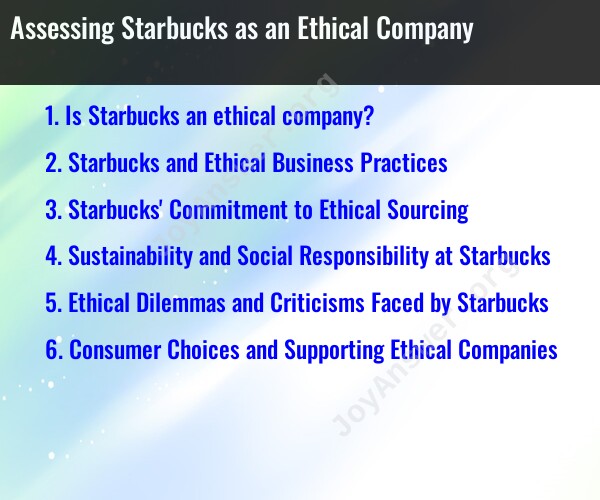Is Starbucks an ethical company?
Starbucks, as a large and well-known multinational corporation, has made efforts to be recognized as an ethical company in various aspects of its business operations. However, whether or not a company is considered ethical can be a subjective assessment, and it often depends on individual perspectives and specific criteria for evaluating ethics. Here are some aspects in which Starbucks has been evaluated for its ethical practices:
Sustainability:
- Starbucks has taken steps to promote sustainability in its supply chain. It has committed to sourcing ethically produced coffee and supporting responsible farming practices. The company has also set goals to reduce its environmental footprint by implementing recycling and waste reduction programs.
Fair Trade:
- Starbucks is one of the largest buyers of fair trade coffee in the world. They have implemented programs to ensure that coffee farmers receive fair compensation for their products and promote social and economic development in coffee-producing regions.
Ethical Sourcing:
- The company has made efforts to ensure that its sourcing practices are ethical, including commitments to source products such as cocoa and tea from ethical and sustainable sources. Starbucks has also focused on supporting communities in its supply chain.
Labor Practices:
- Starbucks has made commitments to provide competitive wages and benefits for its employees. They have offered benefits such as healthcare, stock options, and educational opportunities to their workers.
Social Responsibility:
- The Starbucks Foundation and the company's community involvement programs have been involved in various social initiatives, including education, veterans' support, and disaster relief efforts.
Diversity and Inclusion:
- Starbucks has publicly committed to creating an inclusive and diverse workforce and has initiated various programs aimed at fostering a culture of diversity and inclusion within the company.
Ethical Leadership:
- The company's leadership, including the CEO and senior management, has been vocal about their commitment to ethical practices and corporate social responsibility.
It's important to note that, like many large corporations, Starbucks has faced criticisms and challenges. Some critics have raised concerns about issues such as worker conditions, wages, and the environmental impact of disposable cups. Ethical evaluations can also vary depending on specific incidents or policies that occur over time.
Whether one considers Starbucks to be an ethical company may depend on their specific values, priorities, and criteria for assessing corporate ethics. Companies like Starbucks continuously strive to improve their ethical practices, but ethical evaluations should consider ongoing developments and evolving standards in the areas of sustainability, social responsibility, and labor practices. It's essential to conduct thorough research and consider multiple perspectives when evaluating the ethics of any company.
Starbucks and Ethical Business Practices
Starbucks has a long history of commitment to ethical business practices. The company has a number of policies and programs in place to ensure that its products and operations are ethical and sustainable.
For example, Starbucks is committed to ethical sourcing. The company sources its coffee beans from farmers around the world, and it has a number of programs in place to ensure that farmers are paid a fair price for their coffee. Starbucks also works to improve the lives of coffee farmers and their communities through its Coffee and Farmer Equity (C.A.F.E.) Practices program.
In addition to ethical sourcing, Starbucks is also committed to sustainability. The company has a number of initiatives in place to reduce its environmental impact, including reducing its energy consumption, using recycled materials, and sourcing sustainable ingredients.
Starbucks is also committed to social responsibility. The company has a number of programs in place to support its employees and communities, including providing scholarships to employees and supporting local charities.
Starbucks' Commitment to Ethical Sourcing
Starbucks is committed to sourcing its coffee beans in an ethical and sustainable manner. The company's C.A.F.E. Practices program is a comprehensive ethical sourcing program that assesses farms against a range of criteria, including:
- Fair pricing for coffee beans
- Safe and healthy working conditions
- Environmental protection
- Community development
Starbucks also works to support coffee farmers through its Farmer Support Center, which provides training and resources to farmers.
Sustainability and Social Responsibility at Starbucks
Starbucks is committed to reducing its environmental impact and supporting its employees and communities. The company has a number of sustainability and social responsibility initiatives in place, including:
- Reducing energy consumption by 25% by 2030
- Using 100% recycled materials in its packaging by 2030
- Sourcing 100% sustainable coffee beans by 2030
- Providing scholarships to employees and their children
- Supporting local charities through its Starbucks Foundation
Ethical Dilemmas and Criticisms Faced by Starbucks
Despite its commitment to ethical business practices, Starbucks has faced some ethical dilemmas and criticisms over the years. Some of these criticisms include:
- Starbucks has been accused of paying its coffee farmers unfairly.
- Starbucks has also been criticized for its environmental impact, including its use of plastic straws and cups.
- Starbucks has also been criticized for its high prices.
Consumer Choices and Supporting Ethical Companies
Consumers have the power to make a difference by supporting companies that are committed to ethical business practices. When choosing where to buy coffee, consumers can consider the following factors:
- Does the company source its coffee beans ethically?
- Is the company committed to sustainability?
- Is the company committed to social responsibility?
Consumers can also support ethical companies by speaking out against unethical practices. If consumers see a company that is not behaving ethically, they can contact the company to express their concerns. They can also share their concerns with other consumers and on social media.
By making informed choices and speaking out against unethical practices, consumers can help to create a more ethical and sustainable business landscape.











